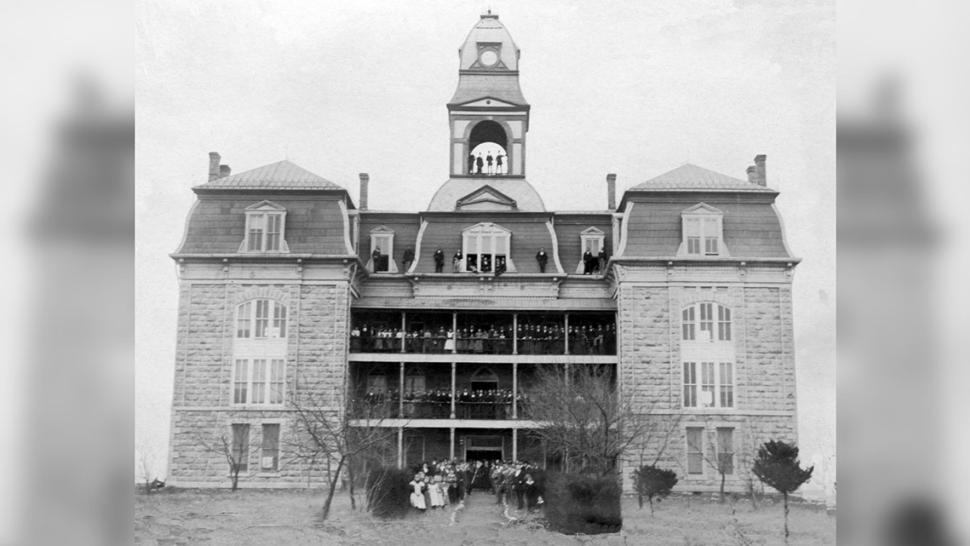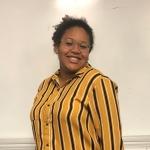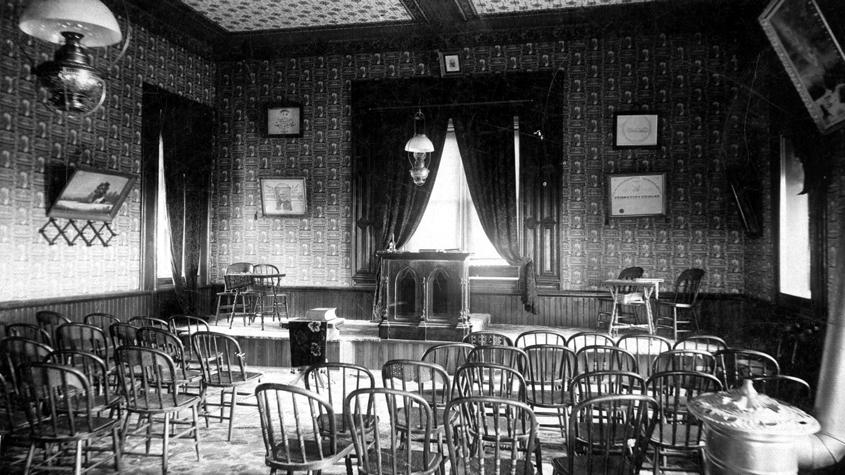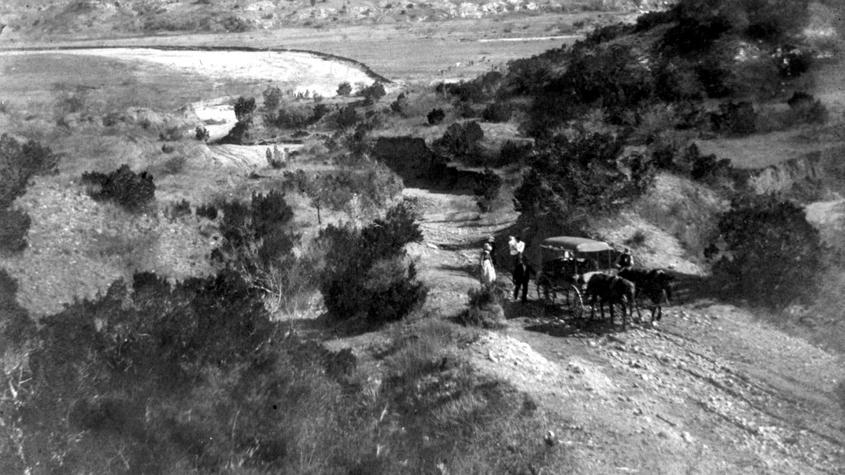
There’s a common misconception about Trinity’s ties to slavery and injustice, according to Camille Johnson ’21.
Namely, that there aren’t any, since the university was founded in 1869 after the Civil War. But through the Trinity University Roots Commission (TURC), a faculty-led effort to uncover and understand racism and injustice in the University’s history, student researchers like Johnson are getting a chance to correct this narrative.
“The Roots Commission is a chance to uncover connections between Trinity’s history and the legacy of slavery that go beyond common knowledge,” says Johnson, an anthropology major and African-American studies minor from Portland, Oregon.
Johnson, along with anthropology major Rohan Walawalkar ’21 and sociology majors Rachel Kaufman ’22 and Cecelia Turkewitz ’21, are spending their summer as researchers for the TURC, launched in 2018 with the support of Trinity’s Office of Academic Affairs and President Danny Anderson. The initiative, led by a team of Trinity faculty, is looking at the lasting impacts of chattel slavery and the origins of the wealth of Trinity’s founders. Faculty working with the undergraduate team this summer include Sarah Beth Kaufman, Alfred Montoya, and Jennifer Matthews, all from the Department of Sociology and Anthropology, and Lauren Turek from the Department of history. The TURC is co-chaired by Kaufman and Turek, and in addition to Montoya and Matthews, includes history professor Carey Latimore and English professor Claudia Stokes (former co-chairs), religion professor Angela Tarango, Associate Vice President for Academic Affairs: Student Academic Issues and Retention Michael Soto, and Special Collections Librarian Colleen Hoelscher, with advising from retired Trinity faculty Douglas Brackenridge and Linda Salvucci.
Clues to the Past
For Turkewitz, conducting research on a restorative justice project like the TURC unfolds almost like a cold case.
“I feel a bit like a detective, looking for things,” says Turkewitz, who’s interested in criminal justice and law. “I’m learning to research correctly, tie different sources together. This is active archival research—and it’s something I’m passionate about.”
To uncover how slavery and injustice shaped the context in which Trinity emerged, Turkewitz and the rest of the group are combing through newspaper archives, federal census data, the Library of Congress, and historical society websites. The team is honing in on any information about wealth connecting Trinity’s founders to unjust practices, such as slavery or sharecropping.
This can be a challenge, even for sleuths like Turkewitz, when encountering resources that aren’t exactly digital, such as 19th century land records. “You can’t just ‘command-F’ and find what you’re looking for,” she says. “But that means when you do find something, it’s just so exciting that we call up everyone else in the group just to share it.”
Having access to resources like Trinity’s Special Collections library has also been invaluable for the group, Rachel Kaufman says. ““It’s the coolest thing in the world to have [special collections librarian] Colleen [Hoelscher] helping us.”
“Some things we’re looking for would have taken us two days on our own,” Turkewitz adds, “but I ask Colleen for help and they’ve turned it around already like, ‘Here it is!’”
Faculty Guidance
TURC faculty members have also been an invaluable resource for students on the project. Before the summer work started, the faculty team had already worked to compile a staggering mix of historical sources and records, including:
- Existing university records, including records that perished in a fire. These “lost” items, such as records of land purchases and donations, in some cases have left a trail of additional documentation indicating their existence.
- Publicly accessible historical documents from the Freedmen's Bureau and U.S. Census, including slave schedules (population schedules used in 1850 and 1860).
- Probate records and wills, land records, and the archives of the Cumberland Presbyterians connected with Tehuacana Historical Association, the Limestone County genealogist, and current owners of "Texas Hall" (the first Trinity).
The team has created an archive at Coates Library, developed a bibliography of pertinent secondary sources, and this summer began building an Omeka website, intended to be a public-facing exhibit.
On top of this workload, Johnson and the undergraduate researchers on the team say each of the faculty have also taken time to support and develop ties with their students. With faculty help, each student was able to connect to funding for their summer research through sources such as the McNair Scholars Program, the Mellon Initiative, and a Murchison Research Fellowship.
This level of support extends to day-to-day research work, Johnson says.
“Our mentors, Dr. Matthews for me, Dr. Kaufman for Cecelia and Rachel, and Dr. Montoya for Rohan, were all close to us even before the Roots Commission,” she says. “And a lot of their role has been direct support and guidance: they’ve given us feedback on what we’ve been uncovering.”
“Dr. Kaufman has all these questions that I don’t even think to ask,” Rachel Kaufman says. “Figuring out who owns archives in Tehuacana, looking into wealth passed through the maternal side of families: she’s incredible at helping me re-direct my thinking when I hit a crisis or get stuck.”
But for all this support, faculty have also fostered a sense of autonomy with their students, Walawalkar and Turkweitz say.
“They’ve also been encouragingly hands-off this summer, giving us contacts and access to information and support, but then letting us grow and figure out how to do quality work ourselves,” says Turkewitz, while Walawalkar says of Montoya, “We know each other’s rhythm: it’s like we contact each other exactly when we know we each are going to need something.”
Reconstructing Reconstruction
As other institutions like Georgetown, Brown, and Harvard continue similar investigations into their links to slavery, Trinity’s research has a chance to contribute in a unique way.
These other projects are examining schools’ antebellum (pre-Civil War) ties to slavery, but much of the TURC’s work is shedding light on the legacy slavery imposed on the Reconstruction era.
“It’s not like the effects of slavery were wiped out in 1863,” Walawalkar says. “And unfortunately, recent events have made what we’re researching really relevant.”
Through the TURC, these relevant connections are taking shape. Among the many ways Trinity’s history has been shaped by the racial violence of the Reconstruction include:
- Wealth accrued during the antebellum period through the labor of enslaved people enabled Trinity founders to acquire land, erect the first buildings, and hire teachers and staff in Tehuacana.
- While the white descendants of Trinity founding members have enjoyed positions of privilege such as "legacy" entrance to the university and positions on the Board of Trustees, Black descendants–those people whose birth resulted from relationships between Trinity founders and the people they enslaved—are written out of this history and denied those resulting privileges.
- Those aforementioned University records that perished in a fire actually suffered two separate courthouse fires, as part of multiple campaigns of terror waged against Black freedpeople in East Texas. Thus, some of Trinity's early history is literally made invisible by racial terror.
Building a Better Future
Each of the students on the project says the TURC continues to shape their futures in both conventional and unexpected ways.
Walawalkar, for instance, wants to go to medical school and has previously done research in psychiatry. “This was a different challenge than I was used to, but this experience is still something I’m going to [draw from] going forward.”
For Turkewitz and Kaufman, working with the TURC is a perfect intersection of their academic skill sets and a passion for social justice. While Turkewitz wants to pursue a law degree and a career in civil rights law, Kaufman plans to pursue a doctorate in sociology, saying “I love research, and this is an incredible opportunity to bring to light something that Trinity should have examined long ago. Why wouldn’t I put my whole heart into this?”
For Johnson, the work of the Roots Commission resonates on a personal level. As the first student researcher brought onto the project in January 2020, she’s played a crucial role in both the group’s research and the process of building a website for the project. “Camille is the one we all go to when we have questions—she’s been holding us together in so many ways,” says Rachel Kaufman.
“I’m interested in a future in museum studies, especially working with museums dedicated to social justice and African-American history,” Johnson says. “So being able to do this type of work in research, whether it’s creating a website or going into archives, has been pretty awesome.”
TURC co-chairs Sarah Beth Kaufman and Turek say the TURC’s continued work also has major implications for the future of Trinity’s community, too. The commission intends to continue connecting with other universities and scholars engaged in similar work and aims to hold a conference as soon as is viable. The TURC also intends to expand its future scope to include a focus on indigenous history in Limestone County, where massacres of tribes took place in the 19th century.
“We want to use this research to position Trinity as a leader for other universities founded during Reconstruction who are embarking on Roots projects,” Kaufman and Turek write. “Engaging undergraduates in multidisciplinary Roots research, creating public scholarship, and developing digital exhibits are ways that we are models.”







